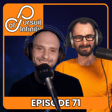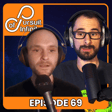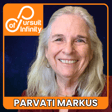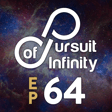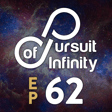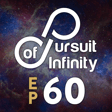Become a Creator today!Start creating today - Share your story with the world!
Start for free
00:00:00
00:00:01

5. Interview: Brian Charlebois
In today's interview, we discuss the political atmosphere and its future in the ever evolving digital world with Brian Charlebois. Brian is an activist and inventor with plans on creating a new platform for political discourse.
_________________
Music By Nathan Willis RIP
Follow Pursuit Of Infinity:
www.PursuitOfInfinity.com
Discord: https://discord.io/pursuitofinfinity
YouTube: https://www.youtube.com/channel/UCPpwtLPMH5bjBTPMHSlYnwQ
Spotify: https://open.spotify.com/show/58he621hhQ7RkajcmFNffb
Apple Podcasts: https://podcasts.apple.com/ca/podcast/pursuit-of-infinity/id1605998093
Instagram: https://www.instagram.com/pursuitofinfinitypod/
Patreon: Patreon.com/PursuitOfInfinity
Transcript
Introduction and Announcements
00:00:01
Speaker
Hello and welcome to another episode of the pursuit of infinity podcast. Today we have an interview with inventor and political activist, Brian Charlebois.
Digital Politics and Audience Engagement
00:00:12
Speaker
We had a really interesting conversation about the future of politics in an ever evolving digital world. But before we get to the interview, if you want to support the show.
00:00:25
Speaker
please consider visiting our Patreon at patreon.com slash pursuit of infinity. We're also on Instagram at pursuit of infinity pod. And another great way to support the show is to give us a five star rating on any platform that you listen to us on. That really helps us to broaden our sphere of influence and get bigger and better guests. So we appreciate that.
00:00:53
Speaker
And without further ado, here is our interview with Brian Charlebois. Thank you for listening.
Non-Partisan Dialogues with Brian Charlebois
00:01:25
Speaker
Uh, we were talking before the recording, um, about how our last conversation went and how I, uh, I appreciate the fact that, um, having a political conversation with someone who I can't tell their political affiliation, uh, is nice. It's enlightening. Uh, it's not often you find someone who doesn't align themselves with either side of the tribalistic nature of our politics. So thank you for that.
00:01:53
Speaker
Yeah, well, you're welcome. I don't know if I 100% fit that category. There are certain people I won't vote for. And I do carry some strong ideas that are strongly linked to one side or the other in certain areas. So, you know, I do consider myself to be a left of center.
00:02:18
Speaker
And, um, uh, I think anybody, uh, I think even conservatives though, when you really dig, uh, are more left than they realize. So. Yeah. And I think understanding that from either side, understanding the perspectives of the other side, I think is essential to really having a conversation because conversations are the way that we figure out, you know, what we can do about the problems that we have in this country. Yep. Yes.
00:02:48
Speaker
I monitor all sides as best I can to get the best grip I can on what society is doing at the moment.
Societal Change and Governance Challenges
00:03:00
Speaker
That can take a lot of my time just doing that. So what do you think is going on with society at the moment?
00:03:08
Speaker
Well, I think the biggest issue is that we're going to through almost a second reformation.
00:03:19
Speaker
The printing press caused a massive amount of chaos when it was first invented. There were attempts to hold it back, but it eventually became commonplace, and as it became a cheaper technology, more and more people got it. And the free press is what we got out of that.
00:03:45
Speaker
With that, with all the chaos that the printing press caused, with the free press, we were able to find some kind of order. It's still extremely chaotic even to this day, but we have managed to find enough order to maintain a democracy or democracies throughout the world. Without that, it wouldn't have been possible.
00:04:09
Speaker
So we have to go through the pains that it took. And there was a lot of pain involved with that. But I think most people would agree that we've stepped forward a great deal with the printing press. And so we're going through that again right now with the internet. And right now we are at the chaos point where we're not finding the order.
00:04:35
Speaker
that the internet should be able to provide us with. And so that's where we're at at the moment and politically. And on top of that, we have a lot of pressure to get this right.
00:04:51
Speaker
You know, there's global warming and, you know, nuclear proliferation. And here we are, we're looking at more conflict in the world here, you know, the Ukraine and Russia and China. And democracy is at a very scary point right now because it was never really, really stable.
00:05:19
Speaker
I think it was a bit of a myth to think that democracy was something that everybody wanted. We spoke a little bit off this recording about how people are... That's not their first choice. Democracy is nobody's first choice, almost nobody. There's a few people like me that
00:05:46
Speaker
really believe in it but for most people and most people I talk to I can when you dig down democracy is not their first choice because authoritarianism having a one leader the what everybody everybody has their own idea of the benevolent leader and if they had that that would be their ideal choice because things would move so much faster
00:06:14
Speaker
And there's lots of examples of the past to show how quickly we can change our society with a leader that has the right goals. And it's really hard for democracy to compete against this. It's extremely hard. I don't think there's many people in China right now that believe democracy is the better option than what they're doing.
00:06:40
Speaker
considering how well they are advancing at this point. It's a really hard argument to be able to say democracy would have gotten you further. I don't think that democracy even could have gotten them as far as they have gotten if they had democracy in their country. I can't even argue that. So it's really difficult
00:07:03
Speaker
to try to promote democracy as the ultimate alternative.
00:07:12
Speaker
So do you think that it's even possible to have a conceptual benevolent leader that can lead to prosperity for not just a country like China, but for the betterment of the world? Because it seems that the concept of a benevolent leader depends upon the person who is
00:07:36
Speaker
Casting their opinion of that person. So each person may, or each group, each country may have a different definition of what a benevolent leader might do or might stand for. So do you find that there might be some pitfalls? Obviously we see with China that there are pitfalls.
00:07:55
Speaker
Well, once again, if you look at the overall picture, it's hard to be able to say that, you know, like what they're doing with the Uyghurs or some of the other things that are happening in their country. Most of their people feel those are minor things compared to the advances that they have made. And it's hard to argue against that. So yes, there are pitfalls. Obviously, if I think the leader of China right now,
00:08:22
Speaker
He's starting to show his colors a little bit, and I think as he gains more and more power and consolidates his power, we will see the darker side of what comes of authoritarianism. They're all people are flawed, and this is the problem. The type of people that seek leadership are the last people that we want to give that kind of power to. There's lots of good people in this world.
00:08:50
Speaker
And there's lots of good people that would not do harm and would do far more good than harm. But they're people that also do not try to lead. And they're the type of people that are not going to pursue these positions. And so therefore, that gives a good argument to a sortition. I don't know if you're familiar with sortition.
00:09:13
Speaker
But that's a lottery system where instead of a democracy, people put their names forward that would like to try out for a position. And then it's done by lottery. And Malcolm Gladwell does a really good podcast about that. And it has some really good results. And I don't doubt that the world would be better if we did that. But that's not the solution I want.
00:09:42
Speaker
I think another big problem we're having in our society is depression and the lack of people don't feel they have control over their lives or over the overall what's happening in their world. The sortition system doesn't solve that. I think that, like I said, so let me promote what I think democracy could be.
Public Skepticism and Decision-Making
00:10:11
Speaker
And we are heading that way right now, too. First of all, I want to say that right now the Internet is causing all this chaos and we're not finding the order within that chaos. There's various reasons for this, but there is actually a concerted effort not to find the order within the chaos because it might not be to the advantage of the people that are in power. And it's not just them.
00:10:36
Speaker
that are holding back what the internet can do. It's everyday people. If I post on Reddit something along the lines of promoting direct democracy, the criticisms come hard and fast. And the criticisms are that the people are not smart enough. Let's start way back at the beginning here of the idea of the entire concept of democracy.
00:11:00
Speaker
When the concept first came up, it was the business owners that were first promoting this, lawyers and business owners. And they were thinking of a democracy of themselves, not a democracy of everybody. And everybody else agreed with them.
00:11:20
Speaker
Because the average person doesn't think the other average people around them are smart enough. And they think that at least these people have made some money. At least these people have elevated themselves in society. And for that reason, I would rather they made these choices, that they were the people that have more control. The average people think this. The average people do not trust the people around them to make the decisions needed for a society to move forward.
00:11:49
Speaker
And so that was way back when I, when the first person, you know, when, when the first words are spoken, that all men are, all people are created equal. I can guarantee the average person thought that's insane. They didn't think that was, and it's not true. I mean, I'd like to point this out. That's not a factual truth.
00:12:12
Speaker
People are not created equal. People are born with spinal problems. People are born with mental problems. People are born, we're not created equal. The color of your skin and your height and everything else plays into how your life is going to, how you will prevail. This, we are far from created equal. But if we can, if we can absorb that as a truth to even on a, on a, on a superficial level, it helps us society to move forward.
00:12:43
Speaker
So if we take that as a truth, regardless of the fact that we know it's not, it allows society to move forward.
Progress and Societal Goals
00:12:51
Speaker
And it's what we all want it to be. And that is enough. That is enough to make a difference. So when those words are first spoken, I'll guarantee that that was laughter in the room. Everybody went, yeah, that doesn't make any sense.
00:13:07
Speaker
But today with education and people growing up with this phrase and the promotion of democracy, looking at what's going on in the rest of the world, we were doing pretty good. Democracy was doing pretty good that way as far as changing minds and attitudes have changed. It's hard to maintain your racism when you say all people are created equal. It's hard to maintain your hatred of others.
00:13:35
Speaker
So society does change. I'm an old enough person now where I've seen change dramatically from myself and from people around me. Even though I still know people that are racist, it's not nearly as prevalent as it was. And their attitudes have changed to some degree and they're kind of kind of scared to say anything, which is a good thing. Homophobic homophobia has definitely changed massively.
00:14:07
Speaker
So all these changes only take place when the majority see it as right. There has never been any minority that has won anything without changing the mind of the majority. And so we are capable of being sympathetic to the minorities amongst us. And so society can change.
00:14:36
Speaker
And it is fast enough. I don't know. We're kind of stagnant a little bit at the moment. You know, we've made drastic changes since the beginning of democracy, but at the moment, things seem to be stalling. And this is, like I say, because of the chaos that's being created by the Internet.
00:14:56
Speaker
So before we go into exactly how we think that we can make these kinds of changes and sort of steer our society in the right direction, I think we should define what right is and what is prosperity. Yeah. You know who I think spells that out the best? And he's quite the guru.
00:15:21
Speaker
He fits the real classic definition of guru. He sells supplements and what have you. He's not too well known though. His name is Daniel Schmacktenberger. Oh, I love that guy. Yeah. He's fantastic. Are you familiar? Oh yeah. He's a genius. I think he really, he's onto something for sure. He spells out the problems of society so succinctly and you know, and so much better than I can.
00:15:50
Speaker
He gets so close to thinking about things in the same way I do that I would love to talk to him and I've tried to contact him and I've had no luck whatsoever. But there are things I could do maybe to get into the realm a little bit better with the different groups that deal with him. But yes, he spells it out. I would highly recommend anybody to hear some of his talks. He's been on many podcasts.
00:16:22
Speaker
He's more succinct than I am, but he is a bit jarbled in how he puts his information out. You really kind of have to listen a little bit to try to get the full picture. He gets off track once in a while, and I suffer from this as well.
00:16:38
Speaker
I don't begrudge him too much. It's not the worst thing in the world. But if you pay attention, he seems to be saying everything correctly as far as what needs to change. And what really abases me that he travels in the conservative circles. He's on the more conservative podcasts. But what he talks about to me
00:17:07
Speaker
sounds almost Marxist.
Game B and Societal Models
00:17:14
Speaker
He's aiming towards a form of socialism that is quite all encompassing. And I agree. I don't see, but he points out, one of the things he points out that is very, plays very well with the conservatives and justifies all their moves at this point is
00:17:38
Speaker
Uh, they call it, they, they call the, what he talks about, they call it plan B. Right. Or not plan, I'm sorry, not plan B. Um, game B or game game B, right? Game B, right. We're playing game A and, uh, we need to move to game B and game B there. It's a, they talk about anti rivalry, no rival risks activity, or, you know, try to not be rival risks amongst our fellow man.
00:18:03
Speaker
And so, I mean, it really comes down to treating everybody like family, or at least what we think family should be. Because not all families are anti-rivalry, let me tell you. So, but they're very good points. And, and I do believe we, he is correct that we need to move in this direction. Whether or not we ever get there, I think it's far fact to think that we're going to ever get a fully anti-rivalry society.
00:18:28
Speaker
anti-rivalrous society. But that's the direction we need to move. There's no doubt about that. But so the main point he makes in using the term game A and game B makes really makes us simple. He points out that if people that are playing, if everybody in the world is playing game A, and then you realize game B is a better idea, right? So you start playing game B, you'll be crushed like a cockroach.
00:18:56
Speaker
by all the game A players out there. Game B can only be done when a large enough percentage of the population are going to switch to game B. And the people that play game B prior are just losers. They will get crumpled. They will get, you know, and I see this all the time. It's actually very true. You know, I see people that think, you know, I have a friend that lives on a commune in British Columbia.
00:19:25
Speaker
And, you know, he talks about this is the way the world has to be. We need to all, you know, kind of move into nature and, you know, so he does his, he wants to live by example, so he does. But living by example means, you know, not being on Facebook all the time, not being, you know, on Twitter all the time. It's living with nature and everything else, right? And it's, you know, gardening and everything else. But if nobody sees it,
00:19:55
Speaker
And nobody can even, you know, can measure what good he's doing or how that would be better. And he's not communicating that to other people. And, you know, traveling to, you know, the different big festivals about the world and making the world better and saving the climate and everything else. He's not there.
00:20:19
Speaker
then nobody sees it and it doesn't go anywhere. He's the game B player in game A and everybody's busy playing their game A and not paying him any attention, right? He doesn't exist. So, I mean, this is exactly it. People say we gotta start small and build our own little communities and let them build. By the time you do that, all the game A players, though,
00:20:45
Speaker
are buying up the world and you're barely able to get this little commune thing running, you know, and you're not making an example. It's like democracy against China at the moment. We're not making it. You can't make a good example. And therefore, it's really hard to win the argument to win people over. People aren't coming to you in droves to do this because they don't even see you. And they're busy playing their game.
00:21:14
Speaker
lives, right? So yeah, so that he points that out very, very well. And I personally, I do see a way around this. I think we need we can slowly change the attitudes in society more towards a game A or to a game B attitude.
00:21:32
Speaker
What does that require? That requires us giving more credence to our fellow human being as far as their thoughts and concerns. And the way to do this is actually measuring public opinion. You know, I was saying earlier that, you know, gay marriage is a great example.
00:21:59
Speaker
Obama could have made gay marriage legal right in his first term, his first day. I think it was quite obvious at this point that society had changed, that the majority wanted gay marriage at that point. It took some time before he felt comfortable as a politician, and he could really see that all there was enough backing behind him that he could make this move without it being an issue at all.
00:22:29
Speaker
He did it when it was extremely safe. It was not a risk at all politically to him. We could have had it earlier. We could have had, what, four or five years earlier, or six or seven. I don't know exactly what the natural field is to, but quite a bit earlier. If we were measuring public opinion properly at the time, then a politician would not have been shy to make that leap.
00:22:57
Speaker
as soon as he could see the numbers changing. There wouldn't be the hesitation there. So, like I said, these things only change when a majority wants it to change. But sometimes it has to go well beyond the majority before politicians clue into this. The same thing can be said for climate action, action on climate change.
00:23:23
Speaker
And we have to the public has to be extremely loud before the politicians are going to move because there's a whole bunch of negatives against They're moving at all on this, you know, they're the oil companies and everything else. They're lobbyists all the rest of us We've got to be loud enough to overcome all of that right Whereas if we were measuring public opinion and they don't want to do it because they don't want that in their face, right? but if we were properly measuring public opinion and
00:23:51
Speaker
We would have been moving a lot harder and a lot faster on this. I have one particular pet peeve on climate change or what should be done. That is that I know I feel very confident would go over very well in the public, but nobody wants nobody is looking to measure this one right now.
Nuclear Power and Climate Solutions
00:24:12
Speaker
And that is how open the public is to the idea of increasing new generation, next generation nuclear.
00:24:22
Speaker
There is a new generation that's coming down the road, and they are working on it now, finally, thank God. But it's been slow and long, and I've been waiting for this for most of my life. And, you know, the way we did nuclear in the past was wrong. And we can do nuclear smart. And even if eventually we want to get off of nuclear eventually, it's the interim thing we need to get us through global warming.
00:24:51
Speaker
Solar is not there. Solar is not there. Wind's not there. It's not going to fucking save us. Michael Moore did about six, eight months ago, almost a year ago, put him and another guy, well, another guy, but with his support, put out a video about how, what a lie solar is and what a lie wind is and batteries, this is not going to save us, right?
00:25:17
Speaker
We need something bigger. And we got it. We have most of the technology there. We need to actually develop the next generation of nuclear. And with the next generation of nuclear, we actually reduce the amount of nuclear waste there is in the world today. Because you can burn it. You can burn more of it. So we can take the nuclear waste we already have today. So that's not an issue anymore. Because we can take the nuclear waste we have today and we can reduce it to a tenth of what it is.
00:25:47
Speaker
It's not garbage, it's reusable. So anyway, that's a pet peeve of mine on the side. I've been monitoring this for the last couple of decades now, and you can talk about nuclear now, and almost nobody speaks up and says, oh, we're done with nuclear, that's crazy talk. Most people don't speak up at all. And when they do, they start talking about the new nuclear.
00:26:17
Speaker
the next generation. And this is a trend that I've noticed here in Alberta and Canada. They made an announcement to our premier and the premier of Newfoundland and of Ontario. Toronto, yeah, Ontario. Anyway, they made announcements about a year ago that they were going with small stage nuclear.
00:26:44
Speaker
And then there was also an announcement that there's going to be development on the next stage of nuclear out of a company in Nova Scotia. And there's no fanfare when they make this announcement. It's on the news, but they don't talk very much about it. There's a quick little announcement. And there's no uproar. It's as if they're making this announcement that they're worried about the backlash. But there's none. It's silent. It's crickets.
00:27:11
Speaker
You don't have anti-nukers out there anymore going, no more nukes. If some politician were to wake up to this, he could make a whole career on this. So anyway, this is where we're not measuring public opinion enough. And that's a tangent, so I want to get back onto real things.
00:27:38
Speaker
Yeah. Anyway, if we were measuring public opinion properly, we would be like China. We would be moving faster. Things could move much, much quicker in our society. We could compete with these authoritarian dictatorships. And we could put up a good show so that we look like the better alternative for countries that are kind of waning and going, you know, which way should we go with this? Is it worth my effort to try to promote this democracy that
00:28:08
Speaker
They haven't moved in 40 years. They haven't done anything significant in 40 years, you know? So, so where does it start? How do we, how do we begin to gauge public opinion more?
Education and Democracy
00:28:21
Speaker
Is it through education? Yes. Well, um, education was always the big obstacle, uh, whenever, and, um, Daniel Schmuckenberger kind of hits this one, uh, at a wall, uh, kind of like a wall.
00:28:34
Speaker
at some point in his discussions too. And a lot of people, they think that we can't move forward until the public is educated to a certain degree. That goes right back to Marx and Kuhn and I think it was his name. He was the one pushing for more public opinion, more public input on governing their world.
00:28:57
Speaker
But Marx and them, they didn't think that was a good idea. And a lot of them, they're not big on democracy for the same reasons I'm talking about. And their hold back is, when we get the public educated, then we can have real democracy. But not until the public is educated. Well, who decides when the public is educated? What's enough? It's been how long? We were talking almost a century since they were talking about it.
00:29:26
Speaker
We're now at a point, and the same thing during the French Revolution, they were going, well, when the public is educated, then we can allow them more say in what's going on. And this was the general thought process of the public, not of the elites. This is the general thought process of the public, that when the public is educated more, then we can do a real democracy. Well, when does that time come? It's been almost a century. Aren't we a lot smarter now?
00:29:56
Speaker
Right? So the point is that we can't, there is no point that we are educated enough. What we need is real world experience. So when we start judging, and I'm going to start talking about judgment here for a minute because this is an issue that I think, you know, everybody says, please don't judge me.
00:30:17
Speaker
And everybody's always worried about being judged. And the fact of the matter is we judge everything. That's what we do. As soon as you spot something, as soon as you look at something, a person, an object, anything, you are judging it. You are judging how it can be used for you, how you can use that thing, how it plays into your life. We are judging all the time. That's what we are here to do. The internet takes very,
00:30:44
Speaker
It strains itself trying not to be judging. And that's the problem. That's part of the problem, right? We don't want to allow people to, you know, give their full opinion on things. That's too judgmental, right? The fact of the matter is we need to wake up to the fact that we're all judging already. We're doing it already. Be better judges. That's what really comes, really what it comes down to. Being a better judge.
00:31:12
Speaker
being a more sympathetic judge, being a more open-minded judge. This is what it comes down to. But don't deny the fact or hide the fact or try to go with it. We need to expand on our ability to judge. So my plan, so let me start with,
00:31:42
Speaker
Nobody asked us if we wanted the printing press. It was imposed upon us. Nobody asked us if we wanted the Internet. It was imposed upon us. Nobody asked us if we wanted Facebook or Twitter.
Public Rating Systems and Information Credibility
00:31:58
Speaker
It was imposed upon us. We can do the same with the next step, and I think it needs to happen.
00:32:05
Speaker
So the next step is simply to do the same thing that Facebook and Twitter and all these others are doing where people are putting their opinions out there, but we need more data to go with those opinions. We need to know who's saying it, what kind of people there are, how many people back them, what percentage of the society does that equate to, what demographics does that fit into, geographically, how does that fit into things.
00:32:34
Speaker
We need all the data. So I want to start something that is, it's basically Yelp. It's a rating system and all of our rating systems right now are flawed. So this makes it wide open for a new kind of rating system. They're all flawed because they all have to make money. So they are put in place for a reason and it's either to make money
00:33:01
Speaker
or to make their money stream from some other source who works smoothly. So, you know, Yelp needs to get advertisers and things like this. So, their rating system can be manipulated because of their fact that they need to make money. And we all know this. We all know that all these rating systems are flawed.
00:33:27
Speaker
So there's in-house rating systems from Uber and Airbnb. And of course, they have their own reasons to screw around with these things because it's all there to make their business flow. So they're all flawed. So if we build a rating system that is publicly owned,
00:33:54
Speaker
and publicly controlled and does not rely on income from outside sources, whether it be donation or whatever system we can come up with, the finances say, which I can get to in a while. This thing will actually generate its own money to an extreme eventually, so be able to pay for itself very easily.
00:34:21
Speaker
So we build a rating system that people first of all can trust because it's not run by a corporate entity. We're going to have our reasons for doing this right out on our sleeve. We're doing it for the public, for the public good, so we can measure public opinion. This is the whole sole purpose. So therefore, people should be able to trust us and over time they will. So we build a rating system. Now there's a rating system on everything.
00:34:51
Speaker
We're on absolutely everything. You can rate a product. We will be discouraging rating people that are not in the public eye, but virtually anybody that's in the public eye is up for grabs as far as opinions and rating them in any way, shape, or form. You don't escape this, though, getting rated.
00:35:19
Speaker
You will be rated in many, many different ways, although it might not, although it probably won't be directed to you as an individual. It'll be directed to you as a demographic. So your demographic that you will be changing the ratings on. So the idea is to build this rating system.
00:35:44
Speaker
where people can rate anything, and there's no commenting here. You can put an opinion about another opinion, but it's not a comment-oriented type of system. So we're linked to everything else. So you see something on Facebook. You see something on Twitter. You can comment about it or put an opinion about it on our system here. Now, when you do this,
00:36:13
Speaker
So the incentive to do this, first of all, is the same incentive that we get with rating systems right now. So people, they want to tell the world what the greatest movie is, or where the greatest restaurant is, or stuff like this, right? So this is the incentive for people to use our system now. And as it grows, and things really get on people's minds, and they want a place to put their opinions in a very permanent manner,
00:36:39
Speaker
This is the place to do it. So something happens on the news. Somebody says something that gets you irate. This is where you go and put your opinion. As it grows, it will become the source for data. As right now, news organizations have been very screwed up with polling.
00:37:03
Speaker
And polling, though, takes up a great deal of airtime in most news organizations because it's their best source of data on the public. We will become that source of data. As we become that source of data to news organizations, then they owe us. So anybody that is using our data, they pay for polling right now.
00:37:27
Speaker
So there's no reason that they shouldn't pay us for that data that they are collecting. And this is one of the first ways that we start making money with this system in a way that is not biased and in a way that seems fair to everybody.
00:37:42
Speaker
So within a rating system like this, I mean, as we've seen plenty of times and as we see more so now, and Daniel Schmocktenberger goes over this as well as Tristan Harris and some other people within his realm, how does this not get hijacked by the powers that be? And how does it not
00:38:07
Speaker
Algorithmically benefit a certain group that decides to take control over it
00:38:14
Speaker
Yes. Well, first of all, the main way is that we're going to build this as a publicly owned entity, and it will be controlled by the public, by its users. It is a rating system, so therefore it becomes very easy to be able to rate how we are working, how the people in the various positions that are being run within our organization,
00:38:38
Speaker
We can vote on who's going to run the place, we can vote on different aspects, and everything that has to do, our biggest Achilles heel is algorithms, yes. Our connection, the people's connection between the data and themselves is a search engine.
00:39:01
Speaker
So we're going to have to keep that as open-sourced as possible, everything as transparent as possible, but that's not unheard of. And other than that, the people that are controlling that stuff is us. We as the public, if there's something we need to change in the algorithm, we as the public, we're going to be involved with what needs to be changed in the algorithm. This is how we maintain trust and how we make sure that it's us in control the entire time.
00:39:33
Speaker
That touches on judgment again. And I just wanted to point out that as far as building trust, how we do that is this will become the first publicly owned and operated institute, worldwide institution. Institutions are what makes society possible.
00:39:57
Speaker
And the stronger and the better the institutions, the better and the stronger the society. Now, we have no strong worldwide trusted institutions. There are none. If we can build a worldwide trusted institution that unites us all in this way, that this is massive for humanity, for the structure of a decent worldwide society.
00:40:23
Speaker
This is a must eventually to have a worldwide society. And so therefore this is a big leap in that direction. So how do we maintain that trust now? The all I want our system to be is the search engine, which we may be able to work with Google, we might have to totally build our own. I'm not sure that's a whole other subject matter. But it's basically comes down to the search engine. And
00:40:54
Speaker
the data bank and there's nothing else involved. It's raw data and the search engine. So there's no manipulation within that data. It's just raw data, right? So your opinions, basically, and where it's coming from and what demographics you are and all the rest of that.
00:41:19
Speaker
All judgment, and this is built for the purpose of judgment. The entire thing is for the purpose of judgment. There's going to be many layers of judgment. There's going to be organizations that are combing our data to judge that data. They're going to be doing it for various reasons, good and bad. And they're going to be combing that data to gather information on our users. And our users are also going to be highly judged within our system.
00:41:47
Speaker
judged by both corporations, entities, various levels and types of judgment. I'll get into that a little bit more, but I just want to touch on anonymity. We want all the data we can on every opinion that's out there, but we can't force people to do that.
00:42:15
Speaker
I want to make it, but the way we need to do this is so that you have the option on every opinion you make, how open you want to be about who you are that made that opinion. So every time you make an opinion, you will have, you will kind of have everything set at a certain setting, but you know how, how you're comfortable, but you know, you can turn it so that you are fully anonymous or change it so that you are saying exactly who you are.
00:42:45
Speaker
Because, let's say, there are people out there that like to put signs on their front yard, right, to say what they believe in, whether it's a union or whether it's a presidential candidate or whatever it is. They put that sign on their front yard. They're doxxing themselves. I want to make it possible for people to doxx themselves in our system.
00:43:08
Speaker
If they want to put the sign in their front yard and say, this is on, this is on, Brian Shaw, and this is what the fuck I'm saying, right? Come and talk to me about it if you want to talk about it, right? I'm putting my name out there. I'm telling you, this is where I live, right? That means something. That means a hell of a lot.
00:43:24
Speaker
If you are going to have an action of some kind against a person or a corporation or anything else and you get a whole bunch of people that docs themselves fully to you to say that they're coming, they're going to be there. You can be pretty damn sure they're going to be there. And let me tell you, I've organized online many times and you are lucky to get 5% or 10% of the people that say they're going to be there.
00:43:53
Speaker
You are doing good at 10%. Why? Because they're anonymous. You don't know them, right? If people are doxxing themselves, that's going to freaking mean something when you're trying to do an action on online. This is the kind of putting it out there that we need. We don't have a level of doing that right now. When you put it out on Twitter, you just put it on Twitter. You don't put it on Twitter and saying, this is where I live and this is my name and fucking come and get me.
00:44:23
Speaker
right? This is a whole other level. So it goes the other way. You can access our system from a random computer anywhere in the world and make an opinion fully, they call that double anonymous. There's no way we can find out who you are. We will accept those opinions as well, right? Now you as a user
00:44:48
Speaker
When you go to look at an opinion, for most stuff, I will have a setting on mine. I'm going to set it so I'm not even going to see any of the anonymous opinions. I don't want to see the anonymous opinions about a restaurant. Chances are they're just somebody who doesn't like that restaurant because they hate the person that works there or something.
00:45:11
Speaker
I don't want anonymous opinions, so I sort them that way, and I'm looking for the person that tells me who they are and everything else, and that's the one. So I'm not even gonna look at those. But if we're talking about China, and we're talking about something going on in China with our Uyghurs or something else, I'm gonna look at all the anonymous opinions, right? Because they might have a bearing in this situation, because I can see a reason why a bunch of people might want to stay anonymous.
00:45:40
Speaker
So I want all the data. Once again, this is all the data. It's there. We don't even have to look at it if we don't want it to. We can look at
Interpreting Public Opinion for Better Judgment
00:45:48
Speaker
it if we need to. We have all the options available to us, whether or not we want to be double anonymous or whether or not we want to put a sign in our front yard. This is the kind of participation we need.
00:46:03
Speaker
as this grows, then there's going to be, you may have noticed when Trump became president, there was a whole bunch of people out there like Elon Musk talking about building a place to find out all the lies people are saying or truth, you know, the truth about stuff, you know, you know, a fact sorting
00:46:27
Speaker
organization to sort through the facts that the politicians are feeding you or you know different internet celebrities right to go through this information with our system we are designed for that we are designed so that other entities can now come in and start analyzing our data so you and I as users we don't have time to analyze all this data
00:46:55
Speaker
Right. We can look at an opinion, you know, we might decide whether or not we want to see the anonymous ones or not and things like this, but you're not really going to get deep into sorting the data. This is where we're going to rely on our, on our friends. And there's, we all get to choose who our experts are. Right. And chances are just like me, I, when I have an issue and I want to talk to my friends about it, I go out and I ask them their opinions.
00:47:24
Speaker
But you know, I don't give them all the same weight or value. My one friend, he might be an idiot. I'll still ask him, but I'll put a certain amount of value into his opinion. And then I'll ask somebody that's, you know, well, he's a real tech guy, so this is a touchy feely thing. So I got to put that little twist on his opinion, right? And then this guy over here, oh, he's a big suck. So you put certain weight on different opinions based on what you know about the people.
00:47:55
Speaker
So the same thing is going to happen. You're going to look at how these different entities, Elon Musk may be running a judgment system and that's combing through our data. And you may like to see what he says about different opinions or his system has come up with for about different opinions and how they are judging those people.
Sympathetic Intelligence and Community Healing
00:48:15
Speaker
But as you look at that, you can also look at somebody else's. You know, Michael Moore might be running one or, you know, Donald Trump will be running one too. You might want to look at them all. And that's how you come to your opinion. You aren't analyzing all the data personally. They're going through it. And they are also analyzing you.
00:48:37
Speaker
So when you are voting on things or making an opinion, they're analyzing that data too. And you can look at what they think of what your opinion is. This is the feedback loop that we're missing. This is the feedback loop that allows us to gain sympathetic intelligence over time.
00:49:01
Speaker
The computers, these algorithms that these people are going to be running, they won't forget what happened last week or last month or 10, 20 years ago. And the stupid tweet you made or the stupid tweet somebody else made. And you're making the same mistake again. And they can see that. And they can tell you, hey, you're a tweet there. You might want to erase that one. Here's why. It's like a friend looking at what you're doing and you're going to take their advice based on who they are.
00:49:32
Speaker
But that advice will make you make better decisions and it will remind you to be more sympathetic and it will remind you to be more, you know, more loving and more understanding of other people's opinions. Because it will point out all the mistakes you made in the past and other people have made, not just yours. You've got the world of data to draw from.
00:49:55
Speaker
Is there all very interesting points and interesting details about how you can make something like this work? It seems to me though, that in order for this to be responsibly implemented and credibly implemented, there needs to be a drastic change in the way that we.
00:50:16
Speaker
connect ourselves to other people and connect ourselves to to nature and that brings me to Do a quote you might be familiar with Charles Eisenstein
00:50:29
Speaker
So the quote goes like this, we have to create conditions where people feel safe and feel safe to care. That goes against a lot of our programming about how to make something change in the world. Sometimes you can pressure people into changing, you can force them, but the powers that be have more force than we do.
00:50:48
Speaker
I don't think we're going to win in a contest of force. I think we need to induce a change of heart. A narrative of us versus them is ultimately part of the problem. Traditional activism, which is about overcoming the latest bad guy, isn't deep enough. It just brings us another version of the same.
00:51:05
Speaker
so i feel like what he's trying to say there is we've sort of we've lost we've we've voluntarily severed our connection to each other to our inner selves and to nature and we've voluntarily isolated ourselves in a culture of technology and social media and it seems that in order to
00:51:32
Speaker
to properly diagnose The issues that we have and to even identify A plan of action we need to reverse this severing and Reconnect ourselves with our neighbor reconnect ourselves with With everybody around us with our communities because we don't have a sense of community anymore I was listening to an interview that he actually was a few days ago
00:52:02
Speaker
Um, and he talked about one of his friends had moved somewhere. Um, and he went to his neighbor's house and knocked on his door and the guy opened the door and he said, what are you doing here? You're trespassing. And he said, well, I just moved here and I want to get to know my neighbors. I want to form a bond of community with my neighbors. And he said, you can't do that here. That's not how it works around here. Um, and I think that's, that's a, that's a big issue.
00:52:32
Speaker
Yeah, well, this comes this to me falls into category of judgment. And so right now, the internet is allowing us to be extremely harsh judges, and there's no consequences. And this is allowing us to dig deeper and deeper and deeper into this. And our lack of communication or connection to others is compounding this. And this is where I'm talking about more involvement.
00:53:00
Speaker
and more involvement with the effects that come with that. And this is where I'm talking about judgment if we're doing it right is a good thing. And so this is where I'm saying that if we have an entity where I'm doubling down on our ability to put our foot in our mouths,
00:53:25
Speaker
And with a system I'm going to create, it's going to be even worse than it is now for somebody to find themselves cancelled in an instant, right? This means that there's only two ways we can go. We're either going to tear ourselves apart or we're going to become more sympathetic. We're going to become more sympathetic to the opinions of others and not be so harsh with our opinions.
00:53:52
Speaker
Because if when we do this is where it goes and when and we're going to suffer the consequences of that so if we are being the The asshole heart judges that we often are on the internet right now those algorithms and things and those judgment systems I was talking about are going to downgrade our opinions so when when you are looking at an opinion on a restaurant, let's say a very popular restaurant and
00:54:19
Speaker
And then you're looking at those opinions through the filter of a judgment system like the one Elon Musk put together, let's say. And he looks at that and he's going through the data. And he sees most of these people are assholes. He just eliminates two thirds of them right off the bat because they just say stupid shit, right? And you know you've been eliminated. This is not a hidden fact that these people, they will tell you.
00:54:46
Speaker
How are you taking my opinion on this or that? And they will give you their rating on you. And if this feedback now tells you, I better not be such a harsh freaking judge, because they're not going to take any of my opinions. Who would? Right?
00:55:02
Speaker
So is there a form of redemption in within this system and, um, and how, I know that a lot of people, including myself are fearful of, um, a social credit score type of concept. So in what way does this differ from a social credit score? And in what way is there redemption built in? Well, scary, scarily close. Yes. We are getting very, very close to a social credit system.
00:55:31
Speaker
I don't see a way around it because it's judgment. That's what it is. People that want to avoid that as the next step for society are people that are trying to avoid the judgment.
00:55:45
Speaker
Uh, both towards them and the other way around. So I guess the question would be how do we form a proper, um, like syllabus for judgment? Uh, well, this is where I'm saying though, that we always have this option of being anonymous, uh, to any degree that we want. Right. So this gives us a bit of an outlet that way. If we want to be assholes, go to anonymous.
00:56:14
Speaker
But like I said, your opinion will be downgraded by most people. So this is real world. This is what the world is. When you go out amongst your friends or amongst your community, right? Are you not living in a social credit system right now? Are they not judging what you're doing?
00:56:37
Speaker
Are they not seeing every time you go into the grocery store? You're the worst asshole there and nobody wants to help you, right? That's part of the social credit system. You've lost your social credit if every time you go into the grocery store, you're the asshole, right? This is just the way life works. Now, this also means you don't want to be the harsh asshole. You don't want to be, you want a system where there is lots of chance of redemption.
00:57:07
Speaker
And I believe there is a real liberal, is always giving an option for redemption, always. There is no, so when it's in our face, that's when, I want to point this out though, when I talked about, you know, everybody is created equal, that puts our hypocrisy in our face.
00:57:37
Speaker
Now, over time, we see it all the time. We're always, you know, you're a racist or whatever it might be that if you have any inclination to want to believe that belief that everybody's created equal, then it's a hypocrisy, almost everything you do that can be at all construed as racist or elitist in any way. And it's that hypocrisy that makes us change.
00:58:03
Speaker
It's not right away. It's not a quick thing. People live their whole lives living in extremely deep hypocrisy. But when their kids see them in that, and they grow up, they don't want to be in that hypocrisy. So it does change over time. And the more it is thrown in our face, the faster the change. So these being judged, building a system that judges us,
00:58:31
Speaker
will help us be better judges. So we give people the option. We know we make mistakes. We're going to make mistakes. And I guarantee all of us will go through a position and go through situations where we're very scared of being canceled. But that's what makes us wake up, right? If we don't go through that, we don't learn. And this is part of the learning process I'm talking about. It's on the job training. We're going through it right now.
00:58:59
Speaker
We are going through it now with the internet, but we can't find the order because we don't have enough data, right? When we get enough data, the order will start to come clearer. It will always look like chaos, just like the printing press still looks like chaos today. But we found some form of order, and we're going to find a much higher level of order when we get enough data along with the chaos that we're creating right now.
00:59:28
Speaker
Yeah, I love the relationship between chaos and order and how it affects our societies. And it reminds me of an Alberta native, Jordan Peterson talks quite a bit about chaos versus order, including the, I think,
00:59:45
Speaker
Almost all of his most recent books have either chaos or order in the title of him, which I am a fan of Jordan Peterson in terms of his clinical work and his books. I find that he's very intelligent and has some great points. I think he's one of the most mischaracterized people out there. You might have some insight on that being from Alberta.
01:00:08
Speaker
I don't think it gives me any extra insight, but I have my areas that I agree with you, Jordan. I don't think he's been overly clear in certain areas. Actually, that whole thing I was talking about how everyone is created equal. I kind of got that in a roundabout way through a discussion, through the argument, the classic or the well-known argument anyway now between him and Sam Harris.
01:00:38
Speaker
What is truth? And that's a perfect example of what he was saying is the whole notion of we are all created equal. It's not true. It's not true by any stretch of the imagination, but yet if we take it as truth, then society moves forward. So in his definition, it's true.
01:01:01
Speaker
So yeah, so at his definition, truth isn't necessarily two plus two equals four, but truth can be defined as something that enhances progress within a positive direction. Correct. And he couldn't say it so succinctly to Sam Harris. I don't understand why he couldn't say it succinctly to him. I listened to another comedian, who's kind of an idiot, I think. He actually put it much clearer.
01:01:30
Speaker
And very similar to what I'm saying, and I think he even used the same example, which is, you know, there's no truth to the statement that we are all created. To me, that's the most glaring example. If Jordan would have used that as an example, I think Sam would have had a hard time arguing that that was not a truth.
01:01:49
Speaker
It would have helped his argument too, because he's a proponent of competence hierarchies and just an alien, a competence hierarchy. There is not necessarily like a, um, inequality of outcome as he would put it. Mm-hmm. Yeah. Yeah. Well, he's a, he gets off on some tangents that I don't agree with as well. Um, I, I don't agree with some, there's, there's certain things Jordan Pearson says that I just cannot, uh, you know,
01:02:20
Speaker
explained in any way that makes sense. And same with Sam Harris, when he says, have you caught him on the latest gurus podcast? I haven't I haven't are not the latest, but he did a decoding the gurus podcast, which I've become quite a fan of. And he was nice enough to go on there. And not it was a terrific discussion, one of the best pushbacks on Sam Harris I've ever heard, and where he willingly took it. And
01:02:50
Speaker
and tried to argue in good faith. But he tried to say that he has no tribe. And they were pointing out he suffers from the effects of tribes, of tribalism, and that there's just no doubt about it. And he just would not recognize this in any way, shape, or form, even though they're throwing it right in his face.
01:03:18
Speaker
It was a really good discussion. I hope Sam really deeply thinks about that discussion. And if there's not kind of an eye opener, I hope for him. But somehow I don't think it sunk in, no.
01:03:31
Speaker
Yeah, I definitely think he's an important thinker of our time and, uh, he definitely has the ability to change his mind. Um, he seems to be, it's like he, he tries to incorporate, uh, like spirituality into atheism and he tries to incorporate, like he, he tries to mix a lot of these ideas.
01:03:50
Speaker
And I think it's a good way to approach things is to, to take the best of both worlds and sort of make them, uh, make them better than they could be by themselves together. Um, but yeah, I, I, I'm interested in his, uh, his ideas about free will as well. I, I'm not sure I agree with him there, uh, so much, but I, I definitely understand what he's trying to get at.
01:04:16
Speaker
I think it's a bit of a silly argument. It's understandable that they want to define things as best they can. It's not an area that I care to think to invest a whole lot of my time on because I'm very confident that it lies in the middle.
01:04:33
Speaker
We're not living in a free will world and we're not living in a determinist world. And even Sam has admitted this. And so, you know, everybody does eventually, you know, at what level do you want to say one of the proceeds the other? Well, that's worth a lot of argument, I guess, and can lead to a lot of argument. But to me, there's no doubt that there is some of both. You know, I think it was
01:05:00
Speaker
Jordan Peterson, again, that said something about the further you move into planning into the future, the less determinism takes place. It's more free will. If you're working towards a goal 20 years down the road and you actually got to that goal, it's hard to say that there wasn't a certain amount of free will in the entire process that it took to get all the way to that.
01:05:29
Speaker
Anyway, I just don't see it as a clear cut choice of one or the other. Well, Brian, I want to be respectful of your time and it seems that we've gone a little bit over an hour here. I really appreciate you coming on and I appreciate your insights. Some of the stuff you're talking about is very interesting, revolutionary almost. And I definitely would like to talk again and see how maybe some of your ideas evolve.
01:05:57
Speaker
Yeah, well, I'm hearing available anytime you want to talk. I love talking about this stuff. So I really appreciate the opportunity to do so.








